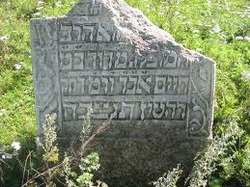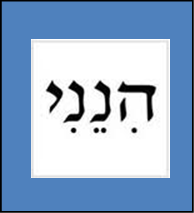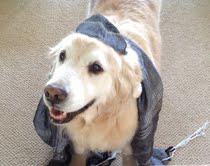
I’ve always been fascinated by cemeteries. When I was in my teens, my mother took me to her native Cleveland and we went to visit the graves of my great and great-great grandparents. Seeing a memorial to their lives that was actually here in America was a great privilege. There is a small cemetery in the middle of Boston on the freedom trail that I’ve visited a number of times. It holds some of the oldest graves in the U.S. and is a history lesson unto itself. Even more fascinating is the above ground Jewish cemetery in Curacao where the tombs are adorned with skull and bones…a symbol later to be adopted by pirates. What draws me to these locations is not death, but the life that can be imagined with the etchings on each gravestone.
This week’s Torah portion is called Chayyah Sarah – the life of Sarah. This is, on the surface, ironic as the chapter begins with Sarah’s death. And, we are told, that Abraham goes to great lengths to purchase a plot of land so that he can bury Sarah. It seems that there is not a question that Sarah will be buried on the side of the road or even on the most picturesque terrain near where she perished. No, Abraham must purchase land for Sarah’s body that, hopefully, will be a remembered spot for generations. It seems to me that the title of this parshat is strategic as it is telling us that we must honor the life of Sarah by remembering her, and to remember her, she must be buried in a spot where a marker exists to commemorate her life, a place that will belong to her people in perpetuity.
My sister and her husband have instructed in their wills that their bodies be donated to science when they die. My step-father, a fisherman, has requested that his ashes be sprinkled over the gulfstream. But, I have a plot where I will be buried with my grandparents, my mother, and my husband. It isn’t a matter of where my deceased body is placed – it could be given to science or cremated – that isn’t the issue for me. What feels important and what I believe our ancestors are saying is that it is essential to have a sacred place where our life can be considered and celebrated…after we physically cease to exist.
Over the years, I’ve done quite a bit of genealogy research on all the branches of my family. But, the line that has really captured my interest is the one of my maternal grandmother. Though she never elaborated, she always repeated the story that we were from Alsace Lorraine and that we were related to Alfred Dreyfus. So, a few years ago, I decided to see if I could find proof of this relationship. Through ancestry.com, I traced my great-great grandfather back to Wurrtemburg, Germany…a part of Germany near the Black Forest and also across the border from Alsace in France. Though my great-great grandfather’s last name was Anthony, I knew that he had changed it from Meyer when he came to America in the 1870’s. Then, in my local library, I came across a biography of Dreyfus, complete with a family tree. It turns out that the family matriarch, Dreyfus’s great-great grandmother, was Brandel Meyer, from the German side of the Black Forest. After continued research, I’ve come to realize that they only way that I will be able to bridge the gap between Julius Meyer, my great-great grandfather, and Brandel Meyer, Dreyfus’s great-grandmother is to actually go to the French German border and visit Jewish cemeteries that are still in existence. Those plots of land, dedicated to our ancestors, and lined with headstones demarcating their lives, will be what enables me to connect the broken link in my family tree.
In Aryeh Kaplan’s Torah translation of Chayyah Sarah, it says that with Abraham’s transaction, Ephron’s field in Makhpelah adjoining Mamre became his uncontested property. This included the field, its cave, and every tree within its circumference. It was Abraham’s purchase with all the children of Heth who came to the city gate as eyewitnesses. Abraham then buried his wife Sarah in the cave of Makhpelah Field, which adjoins Mamre (also known as Hebron), in the land of Canaan.
In the book “Your Name is your Blessing,” it says a name captures a person’s character and personality. It describes everyone’s mission on earth. It contains a prophecy as well as a powerful, potential blessing. It is the only possession we have that remains with us even after death. And, by following the burial tradition of Abraham, we, too, can ensure that our name, our story, and our memory is an unforgotten blessing.
This week’s Torah portion is called Chayyah Sarah – the life of Sarah. This is, on the surface, ironic as the chapter begins with Sarah’s death. And, we are told, that Abraham goes to great lengths to purchase a plot of land so that he can bury Sarah. It seems that there is not a question that Sarah will be buried on the side of the road or even on the most picturesque terrain near where she perished. No, Abraham must purchase land for Sarah’s body that, hopefully, will be a remembered spot for generations. It seems to me that the title of this parshat is strategic as it is telling us that we must honor the life of Sarah by remembering her, and to remember her, she must be buried in a spot where a marker exists to commemorate her life, a place that will belong to her people in perpetuity.
My sister and her husband have instructed in their wills that their bodies be donated to science when they die. My step-father, a fisherman, has requested that his ashes be sprinkled over the gulfstream. But, I have a plot where I will be buried with my grandparents, my mother, and my husband. It isn’t a matter of where my deceased body is placed – it could be given to science or cremated – that isn’t the issue for me. What feels important and what I believe our ancestors are saying is that it is essential to have a sacred place where our life can be considered and celebrated…after we physically cease to exist.
Over the years, I’ve done quite a bit of genealogy research on all the branches of my family. But, the line that has really captured my interest is the one of my maternal grandmother. Though she never elaborated, she always repeated the story that we were from Alsace Lorraine and that we were related to Alfred Dreyfus. So, a few years ago, I decided to see if I could find proof of this relationship. Through ancestry.com, I traced my great-great grandfather back to Wurrtemburg, Germany…a part of Germany near the Black Forest and also across the border from Alsace in France. Though my great-great grandfather’s last name was Anthony, I knew that he had changed it from Meyer when he came to America in the 1870’s. Then, in my local library, I came across a biography of Dreyfus, complete with a family tree. It turns out that the family matriarch, Dreyfus’s great-great grandmother, was Brandel Meyer, from the German side of the Black Forest. After continued research, I’ve come to realize that they only way that I will be able to bridge the gap between Julius Meyer, my great-great grandfather, and Brandel Meyer, Dreyfus’s great-grandmother is to actually go to the French German border and visit Jewish cemeteries that are still in existence. Those plots of land, dedicated to our ancestors, and lined with headstones demarcating their lives, will be what enables me to connect the broken link in my family tree.
In Aryeh Kaplan’s Torah translation of Chayyah Sarah, it says that with Abraham’s transaction, Ephron’s field in Makhpelah adjoining Mamre became his uncontested property. This included the field, its cave, and every tree within its circumference. It was Abraham’s purchase with all the children of Heth who came to the city gate as eyewitnesses. Abraham then buried his wife Sarah in the cave of Makhpelah Field, which adjoins Mamre (also known as Hebron), in the land of Canaan.
In the book “Your Name is your Blessing,” it says a name captures a person’s character and personality. It describes everyone’s mission on earth. It contains a prophecy as well as a powerful, potential blessing. It is the only possession we have that remains with us even after death. And, by following the burial tradition of Abraham, we, too, can ensure that our name, our story, and our memory is an unforgotten blessing.




 RSS Feed
RSS Feed
